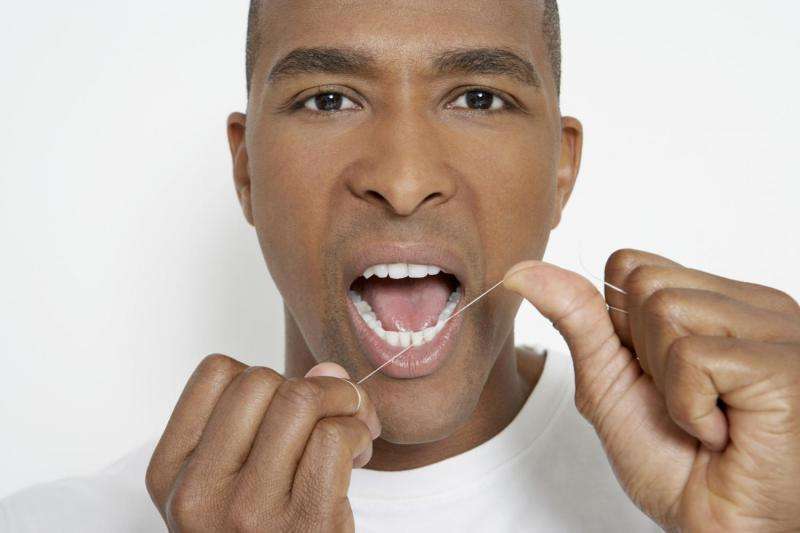Is flossing beneficial? It depends, VCU dental professor says

The Associated Press on Tuesday published an investigative story on dental floss, asserting that there is insufficient proof to support the common claim that flossing is an essential part of oral hygiene.
The news gathering organization's investigative team sifted through a myriad of studies conducted over the past decade, focusing on 25 studies that compared the use of a toothbrush with the combination of a toothbrush and floss. As a result of the research, the AP found evidence for the benefits of flossing to be "weak, very unreliable," of "very low" quality," and carrying "a moderate to large potential for bias."
"The federal government has recommended flossing since 1979, first in a surgeon general's report and later in the Dietary Guidelines for Americans issued every five years," the article states, adding that the guidelines must, under the law, be based on scientific evidence.
Last year, the AP requested scientific evidence on the benefits of flossing from the departments of Health and Human Services and Agriculture. The investigative team followed up with written requests under the Freedom of Information Act.
"When the federal government issued its latest dietary guidelines this year, the flossing recommendation had been removed, without notice," the article said. "In a letter to the AP, the government acknowledged the effectiveness of flossing had never been researched, as required."
As home to Virginia's only dentistry school, Virginia Commonwealth University is committed to serving as a reliable source of information for those who want to learn more about this dispute. VCU School of Dentistry Assistant Professor Parthasarathy Madurantakam, D.D.S., Ph.D., recently answered questions about flossing for VCU News.
Do you still recommend flossing?
The short answer is that it depends on the patient.
Periodontal disease and tooth decay are chronic conditions that have numerous risk factors and are, for the most part, irreversible. The economic, social and emotional costs associated with disease control and rehabilitation far exceed the costs of preventing the disease, so there has been a lot of emphasis on effective prevention strategies.
Since dental plaque is the common causative factor of periodontal disease and tooth decay, the goal of the dental profession has been to reduce plaque buildup. Tooth brushing has been a traditional and effective strategy to remove plaque, but logic dictates that brushing does not effectively clean spaces between teeth where plaque can remain and disease can progress unchecked. Hence, the techniques of flossing and interdental brushing became popular and widely adopted by the profession. Since the intervention is safe and relatively inexpensive with potential for benefit, dentists have long advocated flossing to all patients.
Current scientific evidence does not find any tangible benefit to flossing, but there can be a few reasons for this finding. First, most studies on flossing were associated with moderate-to-high risk of bias. Bias is the systemic deviation from the truth. If we conclude that flossing is not effective based on low-quality studies, we are making incorrect conclusions. Evidence can only be as strong as the studies that it is based on. Absence of evidence is not the same as evidence of absence. The only way to address this issue is to conduct high-quality, long-term randomized trials that can be very expensive and time consuming.
Second, since the studies were evaluating the effect of flossing in conjunction with brushing, it is very difficult to dissect the marginal, additive effect of flossing. We would need a significantly higher number of participants in clinical trials to be able to detect these small differences.
This is where the "depends" comes into play. In healthy adults with good dentition, dietary habits and oral hygiene, and regular follow-up appointments with dentists, flossing may not be of significant benefit. Some patients in this category would floss just to feel fresh and derive potential benefit, and there is nothing wrong with that.
On the other hand, if patients had any of the following risk factors, we would place more emphasis on using all the tools in the kit, which include flossing. Among the more significant factors are systemic diseases such as diabetes; smoking; dry mouth; poor dietary habits (including excessive sugar consumption and snacking); poor oral hygiene; multiple fillings; unreliable follow-up visits; or orthodontic appliances such as braces. It is in these patients that the beneficial effects of flossing could be detected in clinical trials more easily.
What is your response to those who say flossing is ineffective?
The answer depends on the definition of effectiveness. If the question is: "Is flossing effective in removing plaque from interdental areas?" I would say "Yes, if done correctly." If the question is: "Is flossing effective in reducing the incidence of gum disease?" The answer would be that it depends on the specific patient circumstance, taking risk factors into account.
What are the benefits of flossing?
Flossing may be associated with benefit of improving gum health and reducing decay. Again, the degree to which I would stress this on a specific patient would depend on clinical judgement, as well as individual patient circumstance and values.



















